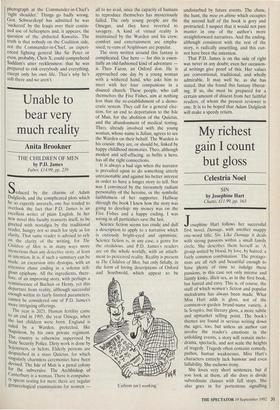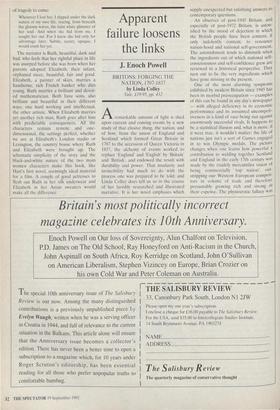My richest gain I count but gloss
Celestria Noel
SIN by Josephine Hart Chatto, £11.99, pp. 163 Josephine Hart follows her successful first novel, Damage, with another snappy one-word title, Sin. Like Damage it deals with string passions within a small family circle. She describes them herself as 'A group united by blood, by love, by hatred, a fairly common combination.' The protago- nists are all rich and beautiful enough to have plenty of time to indulge these passions, in this case not only intense and faintly kinky, illicit sex, as in the first book, but hatred and envy. This is, of course, the stuff of which women's fiction and popular melodrama has always been made. What Miss Hart adds is gloss, not of the common-or-garden brand-name variety, a la Scruples, but literary gloss, a more subtle and upmarket selling point. The book's themes are found in serious writing down the ages, too, but unless an author can involve the reader's emotions in the unfolding events, a story will remain melo- drama, spectacle, and not scale the heights of tragedy. Tragedy often contains comedy, pathos, human weaknesses. Miss Hart's characters entirely lack humour and even fallability. She eschews irony.
She loves very short sentences, but if you look at them, all she does is divide subordinate clauses with full stops. She also goes in for portentous signalling of tragedy to come:
Whenever I lost her, I slipped under the dark waters of my own life, tracing, from beneath the gloomy waves, the faint white glimmer of her soul. And when she hid from me, I sought her out. For I knew she hid only for advantage later. Subtle. secret, opaque, I would crush her yet.
The narrator is Ruth, beautiful, dark and bad, who feels that her rightful place in life was usurped before she was born when her parents adopted Elizabeth, their infant, orphaned niece, beautiful, fair and good. Elizabeth, a painter of skies, marries a handsome, rich French banker who dies young. Ruth marries a brilliant and devot- ed mathematician. Both have sons, also brilliant and beautiful in their different ways, one hard working and intellectual, the other artistic. When Elizabeth marries yet another rich man, Ruth goes after him with predictable consequences. All the characters remain remote and one- dimensional, the settings perfect. whether we are at Elizabeth's London studio or Lexington, the country house where Ruth and Elizabeth were brought up. The schematic simplicity of the story and the black-and-white nature of the two main women characters make this hook, like Hart's first novel, seemingly ideal material for a film. A couple of good actresses to flesh out Ruth in her silk underwear and Elizabeth in her Arran sweaters would make all the difference.



























































 Previous page
Previous page